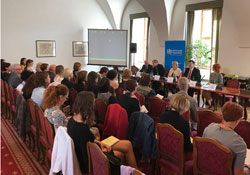Experts debate strengthening response to domestic violence in Czech Senate

WHO
Czech Senate member, Dr Lumir Kantor, welcomed 45 experts from different sectors to debate domestic violence, at the Czech Senate on 16 October 2017. The meeting had been called by WHO, the Ministry of Health and the Third Faculty of Medicine as part of the biennial collaborative agreement.
Dr Kantor spoke of this important area and how in his clinical practice as a neonatologist he had noted the failure to thrive in babies from homes with intimate partner violence. He stressed that gender equality and the response to domestic violence are priority areas for the government, which is committed to the life-course approach.
Dr Alena Steflova, Head of the WHO Country Office in Czechia, welcomed participants on behalf of WHO and emphasized the importance of the health systems response to domestic violence. A recent survey showed that while 27% of respondents reported domestic violence, a quarter of them did not seek help.
Dr Dinesh Sethi presented on the global and European prevalence of violence against women. In Europe, 1 in 4 women have been physically abused by partners, and 1 in 10 have been sexually abused by non-partners. Many preventive measures could be implemented in Czechia and the health service response could be strengthened.
Dr Eva Vanickova set out the guidelines for health workers that had been adapted into the Czech language and context from WHO guidelines. Dr Katie Cosgrove, from Health Scotland, described the systematic approach in Scotland, where there has been incremental change over several years to include domestic violence detection and response training in all medical and nursing curricula at the undergraduate and postgraduate levels, and where there is an obligation to enquire and support.
Numerous examples from civil society were also presented. In the debate that followed, participants expressed firm resolve to expand domestic violence training to undergraduates and nurses, and experts called for cross-sectoral collaboration and more policy action to strengthen both response and prevention.



